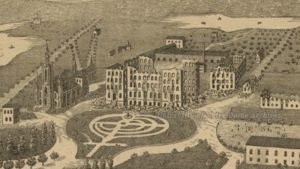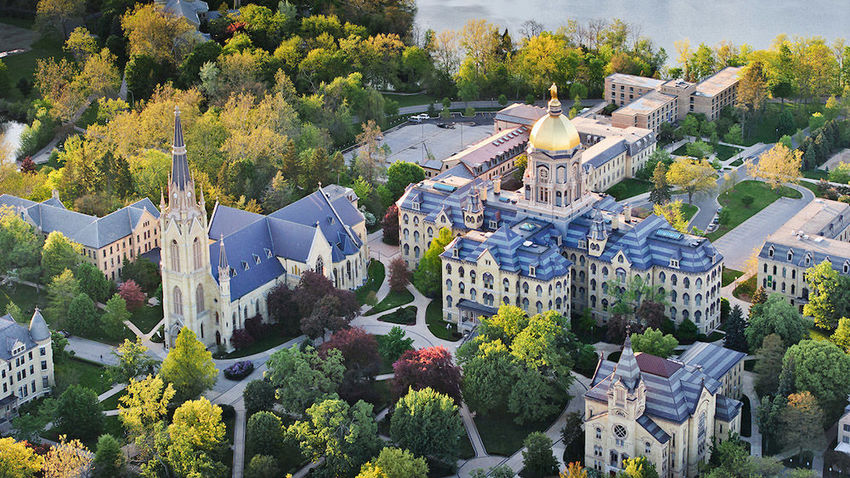Good News!
You have set foot on the Notre Dame campus at a critical juncture in human history. You and I are living at a time when many of the defining features of our existence–our liberal democratic institutions, values, global ideals, relationship with our earthly home, health, and even our acceptance of scientific truth–are under assault. In fact, the scary thing about the record of human development over roughly 2.5 billion years is that all of these features could be gone in 50 years. However, I have another piece of good news. Nothing is inevitable. We may be able to claw our way out of this mess.
You are also lucky!
In ordinary times, it’s hard to see the world as it really is. This is a particularly difficult task for the elite members of society. By virtue of your presence here, you are now a member of the elite. It’s especially hard to see the truth at Notre Dame because you are buffered from the daily trials that most people encounter. On buffering at ND, see Here. Nonetheless, in times of abrupt change and psychological stress, we, the elites, are literally forced to ask hard questions about what matters most in our lives and what the future holds for us and our fellow human beings.
For this reason, this is also an excellent, if sometimes painful, time for you to ask difficult questions about who we are, how we relate to each other and to billions of other human beings beyond conventional geographic borders, and where all of us humans are going. These questions matter at our Catholic university.
In this course, I will provide you with one way of responding to these questions by encouraging you to “think big” about politics and society. Where we are today is not the result of some virtuous act by aristocrats drinking eggnog while writing constitutions. Nor is it the product of educated people who think they know more than less-educated people. Rather, our world is the result of countless, converging forces–erratic decisions, dumb ideas, violent movements, lucky accidents, and natural and self-inflicted disasters–that have passed before us for centuries.
I will provide you with one way of responding to these questions by encouraging you to “think big” about politics and society. Where we are today is not the result of some virtuous act by aristocrats drinking eggnog while writing constitutions. Nor is it the product of educated people who think they know more than less-educated people. Rather, our world is the result of countless, converging forces–erratic decisions, dumb ideas, violent movements, lucky accidents, and natural and self-inflicted disasters–that have passed before us for centuries.
My goal in this course is to introduce you to a single theme that illuminates much of our current condition. This is the ongoing, and necessarily conflictual, evolution and revolution of a novel form of political organization known as the Modern Nation-State.
By Modernity, I mean a revolution in epistemology, human identity, organization, and political reality that has come to fruition over (roughly) the past four centuries. By Nation-State, I mean a “symbolic community to which people voluntarily devote their primary political loyalties despite the many particularistic loyalties–religious, cultural, ethnic, political, social, economic, gender, and athletic–that otherwise divide them.” Modernity and the Nation-State are abstract terms. Still, they are useful tools for introducing you to world politics. Like the best tools, they help us make sense of our particular juncture in the long history of humanity. They also alert us to the fragility of our world and the possibility that we may be the cause of its ruin.
they help us make sense of our particular juncture in the long history of humanity. They also alert us to the fragility of our world and the possibility that we may be the cause of its ruin.
My story is divided into five interlocking chapters. In the first segment, Modern Politics, I shall introduce you to some basic concepts about modernity and the Modern Nation-State. In the second, we travel down the road the West has taken toward a particular form of the nation-state: Liberalism. In the third, we consider an initially credible but ultimately failed path: Leninism. In the fourth, we confront the pathos and rage of people living in theractured Postcolonial world of weak nation-states. Finally, we return to our starting point to examine the ecstasy and agony of the nation-state in an age of Global Instability.
Throughout our course, I shall frequently refer to several troubling themes:
1) the politicization of facts–and fact-seeking–in modern democracies. If we can’t agree on facts, there can be no democracy. There is no such thing as an “alternative fact”!
2) the threat to Liberal democracy represented by populist politics. Populism is not another form of politics. It is anti-politics. In an extreme form, whether it is on the political right or the left, it can kill democracy.
3) the fact that, in our times, politicians and TV personalities can make both highly-educated people and less-educated people in advanced democracies believe just about anything.
My pedagogical goals extend far beyond introducing you to the field we call “political science.” I aspire to:
Inspire you to pursue a “deep knowing” of politics, rather than “much knowing” (a distinction drawn by the Greek philosopher, Heraclitus)
Improve your capacity to defend arguments and persuade others that you are right (or admit you are wrong when you are wrong–and we are all frequently wrong)
Encourage you to develop a critical perspective on everything you think you know.
Challenge you to ask what it means to attend Notre Dame. You have self-selected to be here. This is no normal university. We are a utopian experiment!
The basic requirements for our course are HERE You are responsible for knowing all of this information. I will change the syllabus and its assignments and readings throughout the semester. Thus, you will need to consult it on a regular basis.
I have a modest personal objective throughout our political travels. If I can fundamentally change the way you think about world politics, I shall be pleased.
Please leave your laptops, cellphones, video games, hidden microphones, NSA listening decives, FBI trap-and-trace hardware, and other digital weapons at home. Psychologists have demonstrated that you learn more by listening and taking notes the old-fashioned way. The only swords allowed in my classroom are your pens!
